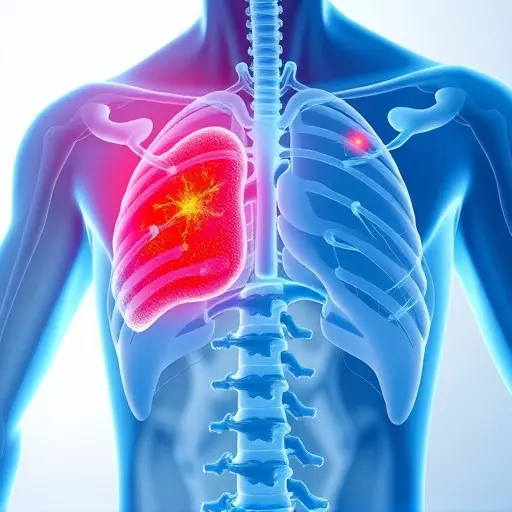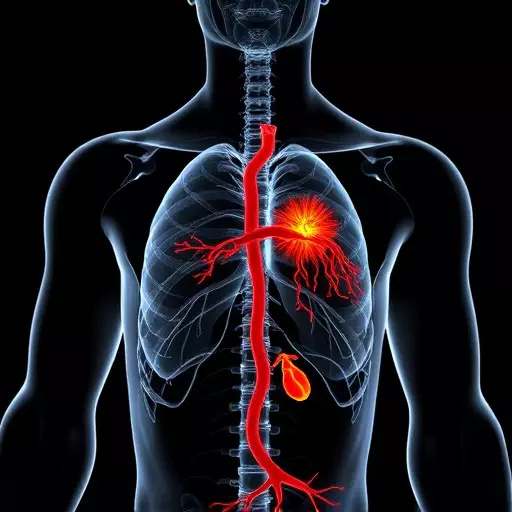Functional medicine in Lansing-East Lansing offers a holistic approach to cholesterol management by addressing underlying causes of high cholesterol and hypertension. It includes personalized protocols with dietary adjustments, lifestyle changes, and supplements tailored to individual needs. These protocols focus on reducing arterial inflammation, optimizing gut health, and managing nutrient deficiencies and hormonal imbalances. By targeting root causes like oxidative stress and insulin resistance, functional medicine provides natural strategies for lowering cholesterol levels, improving cardiovascular health, and mitigating heart disease risks through evidence-based interventions and lifestyle modifications.
Cholesterol particle size plays a significant role in cardiovascular health, with smaller particles correlating to increased risk of heart disease. This article explores functional strategies for improving cholesterol particle size, delving into the impact of functional medicine in Lansing-East Lansing on managing cholesterol. We examine the link between hypertension and particle size, discuss natural approaches to reduce arterial inflammation, and highlight nutritional and lifestyle modifications effective in optimizing lipid profiles. Additionally, we present integrative functional protocols designed to achieve comprehensive cardiovascular health through functional care principles.
- Understanding Cholesterol Particles and Their Impact on Health
- The Role of Functional Medicine in Managing Cholesterol
- Evaluating Hypertension and Its Link to Cholesterol Particle Size
- Exploring Natural Strategies to Reduce Arterial Inflammation
- Nutritional Approaches for Optimizing Cholesterol Levels
- Lifestyle Modifications: Exercise and its Benefits on Lipid Profile
- Integrative Functional Protocols for Comprehensive Cardiovascular Health
Understanding Cholesterol Particles and Their Impact on Health

Cholesterol particles play a complex role in our health and well-being, often overlooked yet critically important. These lipoproteins, composed of cholesterol, phospholipids, and proteins, are responsible for transporting cholesterol throughout the body. While essential for cell membrane structure and hormone production, elevated levels of certain cholesterol particles can lead to significant health issues. Low-density lipoprotein (LDL), commonly known as “bad” cholesterol, is linked to atherosclerosis and cardiovascular disease when in excess. Conversely, high-density lipoprotein (HDL), or “good” cholesterol, helps remove LDL from arteries, thereby reducing the risk of heart conditions.
Functional medicine in Lansing-East Lansing offers valuable insights into managing cholesterol through personalized protocols. By focusing on underlying causes rather than just symptoms, these functional protocols for managing hypertension and reducing arterial inflammation through functional care can significantly impact overall health. This approach considers individual dietary needs, lifestyle factors, and environmental influences that may affect cholesterol particle size and distribution. For instance, certain dietary modifications, stress management techniques, and specific supplements have been shown to promote healthier cholesterol profiles, ultimately contributing to better cardiovascular health.
The Role of Functional Medicine in Managing Cholesterol

Functional Medicine offers a holistic approach to managing cholesterol levels in Lansing-East Lansing residents. By focusing on underlying causes rather than merely treating symptoms, functional protocols for managing hypertension and reducing arterial inflammation become integral parts of this strategy. This personalized healthcare method involves assessing individual lifestyle, dietary habits, and environmental factors that can influence cholesterol particle size.
Through functional care, practitioners aim to optimize overall health, targeting specific areas like gut health, nutrient deficiencies, and hormonal imbalances that may contribute to high cholesterol. By integrating evidence-based interventions such as dietary modifications, herbal remedies, and stress management techniques, this approach empowers individuals to take control of their cardiovascular wellness.
Evaluating Hypertension and Its Link to Cholesterol Particle Size

In the context of functional medicine in Lansing-East Lansing, evaluating hypertension is a key step in understanding and managing cholesterol particle size. High blood pressure, or hypertension, is closely linked to cardiovascular health, including cholesterol levels. Functional protocols for managing hypertension focus on addressing underlying causes rather than merely treating symptoms. This holistic approach involves reducing arterial inflammation through functional care, which can significantly impact cholesterol particle size.
By implementing lifestyle modifications such as dietary changes and stress management techniques, along with targeted supplements, individuals can support their cardiovascular system. These strategies aim to reduce the risk of atherosclerosis, a condition where plaque builds up in arteries, contributing to both hypertension and elevated cholesterol levels. Thus, functional care not only helps manage hypertension but also optimizes cholesterol particle size, paving the way for improved heart health.
Exploring Natural Strategies to Reduce Arterial Inflammation

In the realm of functional medicine in East Lansing and beyond, there is a growing emphasis on exploring natural strategies to reduce arterial inflammation as a key component of managing hypertension. Functional protocols for managing hypertension often go beyond traditional medication by addressing underlying causes such as oxidative stress, insulin resistance, and gut dysbiosis, all of which have been linked to elevated inflammation. Reducing arterial inflammation through functional care involves a multi-faceted approach that includes dietary modifications, specific nutraceuticals, and lifestyle interventions tailored to each individual.
For instance, adopting an anti-inflammatory diet rich in whole foods, antioxidants, and omega-3 fatty acids can significantly mitigate vascular inflammation. Additionally, functional practitioners may recommend targeted supplements like curcumin, resveratrol, or certain vitamin and mineral complexes known for their anti-inflammatory properties. Lifestyle changes such as regular exercise, stress management techniques, and adequate sleep also play a crucial role in reducing arterial inflammation, ultimately contributing to better cardiovascular health.
Nutritional Approaches for Optimizing Cholesterol Levels

Nutritional approaches play a pivotal role in optimizing cholesterol levels and overall cardiovascular health, especially within the context of functional medicine in East Lansing. Functional protocols designed for managing hypertension often incorporate dietary strategies to address underlying metabolic imbalances contributing to high cholesterol. These protocols typically emphasize whole foods rich in fiber, antioxidants, and omega-3 fatty acids, which have been shown to reduce arterial inflammation through functional care.
By focusing on a balanced diet that includes fruits, vegetables, lean proteins, and healthy fats, individuals can effectively support their body’s natural mechanisms for managing cholesterol particle size. In addition to dietary changes, certain nutritional supplements recommended by functional healthcare practitioners in East Lansing may aid in further optimizing cholesterol levels, promoting a healthier cardiovascular system, and ultimately reducing the risk of heart disease.
Lifestyle Modifications: Exercise and its Benefits on Lipid Profile

Regular exercise is a cornerstone of functional medicine in East Lansing and a powerful tool to improve cholesterol particle size. Physical activity plays a significant role in managing lipid profiles, especially when combined with a balanced diet. Research suggests that aerobic exercises, such as brisk walking, jogging, or cycling, can help reduce LDL (bad) cholesterol levels while increasing HDL (good) cholesterol. This effect is attributed to the enhanced circulation and improved cardiovascular health promoted by regular exercise.
Moreover, functional protocols for managing hypertension often incorporate exercise as a key component. High blood pressure is closely linked to elevated cholesterol levels and arterial inflammation. Engaging in physical activities can help lower blood pressure, reduce inflammation throughout the body, and positively impact overall heart health. This multifaceted approach, combining exercise with other functional care strategies, can significantly contribute to optimizing cholesterol particle size and maintaining cardiovascular wellness.
Integrative Functional Protocols for Comprehensive Cardiovascular Health

In the realm of functional medicine in East Lansing and Lansings more broadly, integrating comprehensive cardiovascular health strategies is paramount. Functional protocols designed for managing hypertension and reducing arterial inflammation through functional care have emerged as game-changers. These approaches go beyond traditional medical management by addressing underlying root causes, focusing on the intricate interplay between nutrition, lifestyle, and gut health.
By implementing these functional protocols, individuals can experience significant improvements in cholesterol particle size, a key indicator of cardiovascular risk. Through a holistic lens, practitioners in East Lansing are empowering folks to take control of their heart health. This includes personalized dietary interventions, targeted supplements, and stress-reduction techniques tailored to each patient’s unique needs, ultimately fostering a symphony of optimal health.
